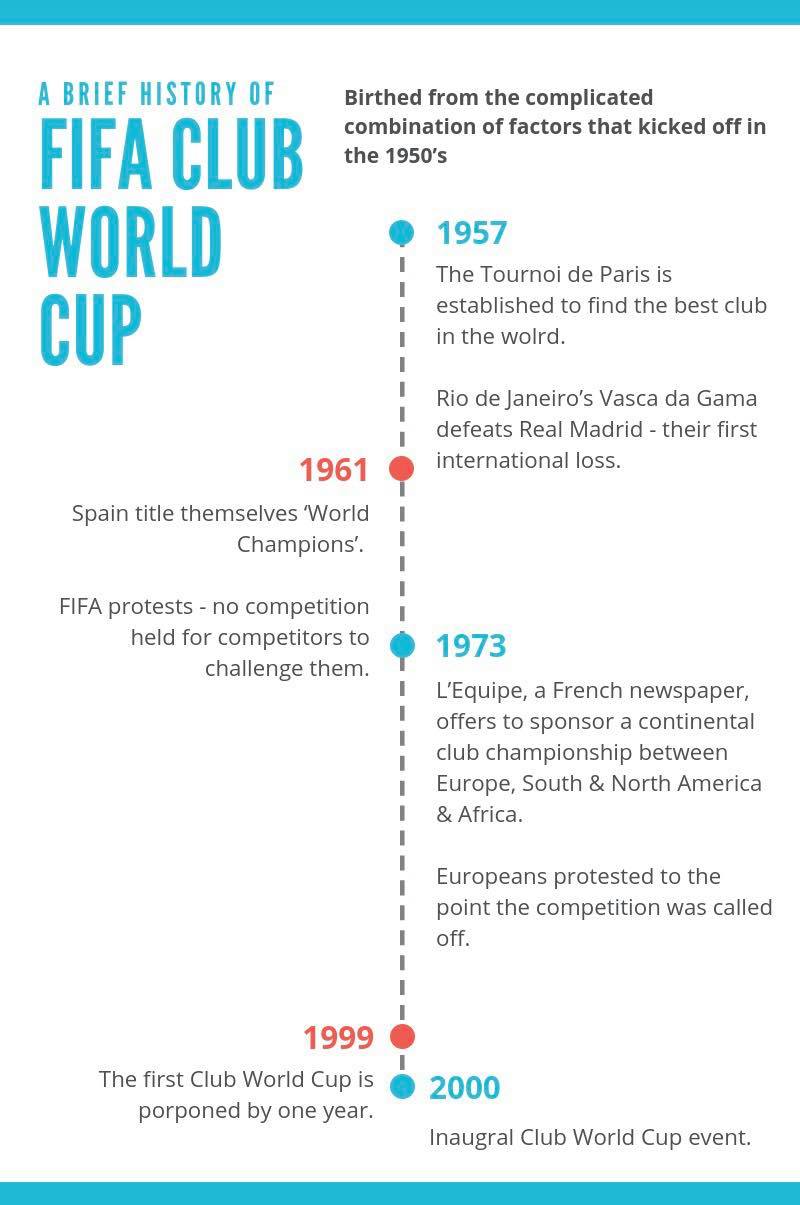The FIFA Club World Cup: The What, How, and When
The FIFA World Cup has dominated public attention ever since its inception in 1904. For one month once every four years, it takes over our televisions as the most-watched sporting event on the planet. Exceeding even the lure of the Olympic Games, with some matches being watched by a ninth of the total population of the planet!
That’s 715.1 million people glued to the screen as teams duke it out for the prestigious 18-karat gold trophy and the accolades that come with it. It has also created multiple offshoots, with competitions such as the FIFA U-17 Women’s World Cup, the FIFA Futsal World Cup, and the FIFA Club World Cup.
FIFA U-17 Women’s World Cup and FIFA Futsal World Cup are easy to distinguish from the FIFA World Cup: they use different sports, different regulations, and award different prizes. The main difference between FIFA Club World Cup and the FIFA World Cup is instead of nations it’s clubs that compete.
Get ready for everything you need to know about the FIFA Club World Cup and place your bets with Mr Green now.
What is it?
The FIFA World Cup is the biggest, most-watched football event – or rather, sporting event – on the planet. Even if you can’t tell the difference between Manchester City and Manchester United, most households tune in just to keep up with the score of their country and see what’s what.
The FIFA Club World Cup is newer, relatively smaller, and definitely more compact than its bigger counterpart.
Its earliest dated event was the Football World Championship, held in 1887 between the Scottish Hibernians and the English Preston North End, ending in a win for the Hibernians. The creation of an international cross-continent competition didn’t really happen until the 2000s, here’s a quick breakdown of the timeline:

How does it work?
The FIFA World Cup pits nation against nation to try and find the best team in the world. Over 200 teams are split into six regions, and over 2 years, they compete to qualify for one of the 32 spots at the World Cup.
The FIFA Club World Cup, on the other hand, pits club against club – so every continent elects a champion through previous competitions to duke it out for the title of champion.
Winners elected to play in the FIFA Club World Cup are chosen based on their performance in champion events, such as the Asian AFC Champions League, African CAF Champions League, North American CONCACAF Champions League, South American Copa Libertadores, Oceanian OFC Champions League and European UEFA Champions League.
There used to be eight teams split into two groups of four teams, but the current format has changed slightly.
Beginning with the play-off round, the host nation’s champions go up against the Oceanian Champions League winners. The winner of that round moves on to the quarter-final round, against the African Champions League winners, the AFC Champions League winners, and the CONCACAF Champions League winners.
The winner of those games will then move onto the semi-finals, and play off against the UEFA Champions League winners and South America’s Copa Libertadores winners, with the semi-final winners playing each other in the final.
What’s the prize?
The FIFA Club World Cup trophy, a gold-plated trophy made out of a compendium of metals, is given to the FIFA Club World Cup winners, along with US$16.5 million in winnings.
Facts and statistics:
Cristiano Ronaldo and Toni Kroos hold an equal four-time-champion record for the FIFA Club World Cup. Furthermore, Ronaldo is the overall top goal scorer for the FIFA Club World Cup, with seven goals in total.
Real Madrid have won the FIFA Club World Cup six times without any losses, and also hold the record for most goals scored in the competition at 25 goals.
Who should you watch?
Real Madrid is one to watch as always, but the new rules created by the Club World Cup might make it difficult for them to triumph this year. For example, substituted players will be able to leave at the closest point, and technical teams in the dugouts are going to have their fate decided by cards.
Most critically though, if a Real Madrid player is sent off during the final leg of the Club World Cup championship, they’ll lose their place in the UEFA Champions League competition match – a hefty blow for Real Madrid.
Other contenders to the cup are Al Ain FC: their 13 league titles and experienced captain could clinch a win for the United Arab Emirates contenders.
—————————-
Now you have all the know-how and insights on the favourites to win, why not head over to Mr Green and kick off your Christmas with some well-placed bets?
Not a member of Mr Green? JOIN NOW, bet €20 & get €20 FREE.